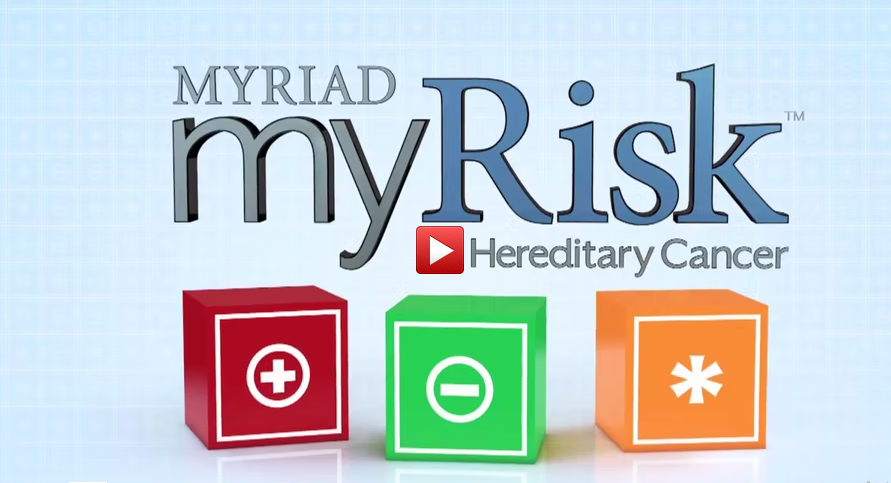myRisk™
Hereditary Cancer Syndrome
Hereditary cancer panel testing optimizes patient care through increased clinical sensitivity (mutation detection). Testing a broader number of genes associated with multiple cancer risks increases clinical sensitivity. For example, many patients have personal and family history that may be explained by more than one syndrome. One patient may meet Lynch syndrome criteria and another may meet HBOC syndrome criteria. However, there are a significant number of patients that meet criteria for both Lynch and HBOC syndromes, among other risks. Myriad myRisk™ identifies elevated risk for 8 important cancers by analyzing multiple, clinically actionable genes.
What is myRisk™ genetic testing?
The Myriad myRisk™ Hereditary Cancer test is a scientific advancement revolutionizing hereditary cancer testing. Blending both genetic test status AND personal cancer family history, Myriad myRisk™ represents the next generation of hereditary cancer risk testing. Myriad myRisk™ identifies elevated risk for 11 important cancers by analyzing multiple, clinically actionable genes. Additionally, Myriad myRisk™ provides a summary of available medical society guidelines to help you optimize your patients’ medical management. Be confident you know your patients’ cancer risks and appropriate follow-up management with Myriad myRisk™ Hereditary Cancer.
The myRisk™ test focuses on clinically actionable mutations that increase risk for a number of cancers :
- Captures more mutation carriers than BRACAnalysis© and COLARIS© combined
- A 48 gene panel that evaluates a broad number of hereditary cancer syndromes to help define patients’ cancer risk with a focus on eight primary cancer sites
- Greater clinical sensitivity than current syndrome tests
- Blends genetic test status AND personal/family cancer history into clinically actionable risk assessment and follow-up
- Provides specific medical management recommendations for patients testing positive AND negative based on the guidelines of leading professional medical societies The Myriad myRisk™
- Test Report is simple, clear and easy to use
- Myriad myRisk™ Hereditary Cancer increases mutation detection by 40-50% in patients appropriate for HBOC or Lynch testing
Hereditary cancer panel testing optimizes patient care through increased clinical sensitivity (mutation detection). Testing a broader number of genes associated with multiple cancer risks increases clinical sensitivity. For example, many patients have personal and family history that may be explained by more than one syndrome. One patient may meet Lynch syndrome criteria and another may meet HBOC syndrome criteria. However, there are a significant number of patients that meet criteria for both Lynch and HBOC syndromes, among other risks. Panel testing also solves the problem of syndrome overlap by testing for clinically actionable mutations in 25 genes that are associated with 8 major cancers.
There are two essential steps to identify your patients for Hereditary Cancer Risk in order to optimize your medical management: Screen and Evaluate. Ask each patient to fill out a Cancer Family History Questionnaire to capture 3 degrees of cancer history for both maternal and paternal family members. Emphasizing to your patients the importance of capturing a thorough family history will allow you to better evaluate their hereditary cancer risk and appropriateness for testing. Review your patient's Cancer Family History using consistent red flags to determine if your patient is at increased risk for hereditary cancers. Once a patient is identified as being at increased risk of Hereditary Cancer Syndrome, Myriad myRisk™ Hereditary Cancer provide the most accurate means of cancer risk assessment for a patient Screening includes Personal and/or family history of:
2 or more: breast / ovarian /prostate / pancreatic cancer 2 or more: colorectal / endomentrial / ovarian / gastric / pancreatic / other cancer (i.e. ureter / renal pelvis, biliary tract, small bowel, brain, sebaceous adenomas) 2 or more: melanoma / pancreatic
Breast Cancer Colorectal Cancer Endometrial Cancer
Ovarian CancerBreast: male breast cancer or triple negative breast cancer Colorectal cancer with abnormal MSI/IHC, MSI associated histology Endometrial cancer with abnormal MSI/IHC 10 or more gastrointestinal polyps
The myRisk™ Test Report is clear and easy to use. It provides recommendations for managing patients based on well-recognized societal guidelines for genetic and familial risk. Every report includes: genetic test results; guideline based medical management considerations for both positive AND negative results; family history analysis based on increased risk logic of guidelines; information for family members.
Over the last 20 years, Myriad has delivered more than one million test results. Results are reviewed rigorously in a strict quality control process, with a second round of testing for reportable mutations.
Hereditary Cancer Syndrome and Myriad myRisk™ FAQs
Please contact us and let us know if you would like to order a test for a patient. One of our representatives will get in touch with you and advise on the workflow, and provide the necessary forms and sample collection kits. Once the samples have been collected, we will coordinate the shipment of the sample to the laboratory. Once testing is completed, the report will be sent to you.
A 7ml blood sample using a standard 10ml EDTA collection tube can be drawn. The sample is sent to Myriad for DNA sequencing analysis.
Results usually take three to four weeks and are sent to the physician who ordered the test.
Myriad myRisk™ uses the same red flags from single syndrome testing. For a simplified approach to remember red flags, use MYR for Multiple, Young and Rare cancers to assess personal and/or family history for hereditary cancer risk.
Every day, new variants are evaluated and classified by the Myriad Variant Classification Program, led by a diverse team of more than 30 scientists, genetic counsellors and variant specialists. Multiple methods and lines of evidence, including proprietary methods (Pheno™ and M-Co™) are used to interpret variants. When deemed clinically significant for the patient’s results, Myriad will proactively reach out to offer targeted genetic testing at no cost to selected family members (family testing or co-segregation analysis) in order to assist in reclassification. When an uncertain variant result is reclassified as clinically actionable, an amended report will be made available to the healthcare provider.


